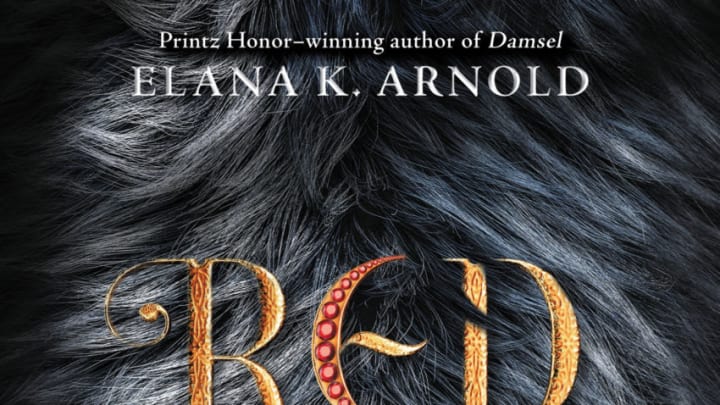Author Elana K. Arnold returns with another dark, feminist fairytale in Red Hood, a version of the story of Little Red Riding Hood that gives women back their power.
In the strictest sense, author Elana K. Arnold’s latest novel, Red Hood, is a contemporary reimagining of the story of Little Red Riding Hood. But it’s also a lot more than that. While this tale does involves girls in the woods and dangerous wolves, Red Hood turns the traditional story on its head, making a cautionary lesson into one of strength and resilience. This version gives the lost girl back her power, and centers the story on women, rather than the monster that hunts them.
Arnold’s previous novel, Damsel, was a disturbingly dark fairytale, which involved a princess, a dragon and a surprisingly twisty story of the power of female rage. Red Hood is, in many ways, Damsel’s spiritual cousin, dealing with similar themes of feminine power and agency. (With a little bit of girl power sisterhood thrown in.)
The story follows sixteen year-old Bisou Martel, whose mother was murdered when she was just four years old. Since then, she’s been living with her grandmother, but after she’s attacked by a giant wolf in the woods, things start to change. The next day, a local boy from Bisou’s school named Tucker turns up dead the same woods, naked and sporting similar wounds as those of the wolf she killed. When a second boy vanishes under mysterious circumstances after menacing a different local girl and another , Bisou’s family secrets – and her grandmother’s life story – come to light.
It turns out that Bisou comes from a long line of women who head into the woods when the moon becomes full, to hunt the wolves that menace women. These wolves are men and though Arnold never explicitly explains what makes some boys into monsters and others not, the constant frisson of fear that runs through the novel – that any boy could be a wolf – is one that feels deeply and disturbingly relevant to any woman’s experience in the real world.
Red Hood is also a story about the bonds between women – who must exist in a world with monsters, and face them down each day, whether in the woods or no. The growing relationships between Bisou and her grandmother, as well as between Bisou and two other girls from school who experience harassment at school, are complex and lovely to watch develop, as they learn to open up to and trust one another. Whether it’s sharing their stories of impossible things or the simple act of believing one another when they do so, Red Hood works because it centers its narrative on the strength of female relationships, on a legacy of looking out for each other that’s run backward for generations.
One of the many lessons of Red Hood is that there are wolves in the woods, yes. There always will be. But we don’t have to face them alone. And these women are stronger together – emotionally and physically – than they are apart. The story of this Little Red Riding Hood isn’t one about girls who are victims, or who wait for men to save them. These women are more than capable of saving themselves, and it’s that on-the-nose subversion of the original tale that makes this novel feels so satisfying.
It should be noted, however, that this story is a violent one, and one that’s not particularly interested in seeing any of these women punished for committing multiple murders over the course of the story. It doesn’t interrogate that aspect of the narrative terribly closely, or do much to imply that the deaths are bad things. (Beyond showing Bisou feeling guilty a couple of times.) But, then again, it’s not like the normal versions of stories like these – the ones that usually are centered around men and their quests and vengeance and desires – do either, and no one judges them for it.
There’s something deeply satisfying about the way that Red Hood conceptualizes femininity and emotion, loyalty and sisterhood. In this world, these things are seen as strengths, not weaknesses and our characters are better for embracing them than not. This novel takes the story of Little Red Riding Hood and uses it to tell a new kind of tale – one in which women are predators instead of prey, where they decide their own fates in the woods, instead of having them forced upon them. Now, if more fairytale retellings could do the same.
Red Hood is available everywhere now.
